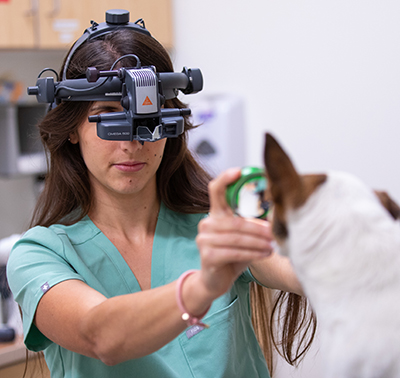
Clinical Service
We are dedicated to providing the highest possible standard of care to veterinary patients with eye diseases. A member of our team is available to deal with eye emergencies 24 hours a day. Although most of our patients are dogs, cats and horses, we also treat a wide range of more “exotic” animals and wildlife species.
The provision of a high standard of care in veterinary ophthalmology demands not only clinical expertise but a range of technologically advanced instrumentation that is not available to most veterinarians. The Veterinary Medical Center provides a range of diagnostic and surgical ophthalmic equipment and procedures that are not available at any other veterinary clinic in the state of Iowa and is rivaled by few centers elsewhere in the country.
Examples of procedures that are carried out routinely by our service include:
- Schirmer tear tests (to assess the patient’s tear production)
- Fluorescein staining (to check for corneal ulcers)
- Slit-lamp biomicroscopy
- Indirect ophthalmoscopy (examination of the retina)
- Gonioscopy and tonometry (tests that are useful in the diagnosis of glaucoma)
- Nasolacrimal duct flushing
- Ocular photography (state-of-the-art digital imaging system)
- Fluorescein angiography (to evaluate the retinal vascular circulation)
- Ocular ultrasonography
- Electroretinography (to test the electrical function of the retina)
In addition to these diagnostic procedures we provide a comprehensive range of surgical options for veterinary patients with eye disease, such as:
- Eyelid and corneal surgery (including corneal transplantation)
- Cataract surgery (using a state-of-the-art technique known as phacoemulsification)
- Lens implantation
- Laser surgery (for glaucoma, ocular tumors and retinal detachment)
- Glaucoma drainage implant surgery
Research
In addition to providing a clinical service to our patients and their owners and educating veterinary students, our team is actively involved in the advancement of knowledge in the field of ophthalmology. Our goal is to minimize animal and human suffering and preserve vision by improving our understanding of the mechanisms and treatment of diseases like glaucoma, retinal degeneration and corneal disease. We regularly present our findings at major national and international meetings and strive to further disseminate this information by publication in textbooks and veterinary and human ophthalmic journals. To find out how you too can contribute to improving animal health and finding new solutions to the diseases that affect our animal friends, please take a moment to visit the webpage of the Companion Animal Fund.
